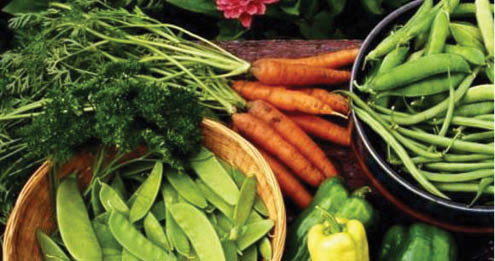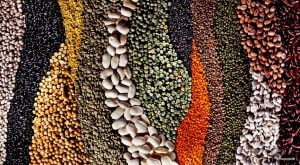 I love food but recently, I started becoming scared of food as well, especially after reading the World Bank report of Pakistan strategic country environmental assessment, 2009. Healthy food not only offers our body the energy and regulates nutritional requirements that a body needs to function, rather provide some side-by health benefits as well. For a healthy life span, we need definitely healthy food. But the question arises; do we take healthy meals regularly? With all the required nutrients? Contamination free? Unfortunately, the food we use to take every day is contaminated with poison (pesticides). We are not only threatened by their toxicity but unaware too, as we use it without thinking about the whole processes by which it is been prepared and brought to us; they not only deteriorate our health but also the natural resources (soil, water) and ecosystem. There is no ambiguity that if we are taking unhealthy food that will diminish the quality of life which sometimes really make difficult to live in severe conditions.
I love food but recently, I started becoming scared of food as well, especially after reading the World Bank report of Pakistan strategic country environmental assessment, 2009. Healthy food not only offers our body the energy and regulates nutritional requirements that a body needs to function, rather provide some side-by health benefits as well. For a healthy life span, we need definitely healthy food. But the question arises; do we take healthy meals regularly? With all the required nutrients? Contamination free? Unfortunately, the food we use to take every day is contaminated with poison (pesticides). We are not only threatened by their toxicity but unaware too, as we use it without thinking about the whole processes by which it is been prepared and brought to us; they not only deteriorate our health but also the natural resources (soil, water) and ecosystem. There is no ambiguity that if we are taking unhealthy food that will diminish the quality of life which sometimes really make difficult to live in severe conditions. A very simple and common disease caused is cancer, it’s quite difficult to verify whether the food is healthy or not at the time of purchasing. Visibility of the food cannot assure its contents. Besides, one thing can be sure and that is the source. Source elucidate that the food come from conventional agricultural practices or organic methods.
Now days, the purpose of agriculture farming is to provide more yield in shortest time rather than quality of the product. To attain the maximum yield, excessive number of pesticide sprays has been done in almost every crop. Especially in Pakistan there is no quality control department that assures maximum residual level (MRL) for pesticides before they arrive in the market for the consumers. So farmers seeks to get maximum yield for which they commonly apply number of pesticide spray sometime before sending it to the market.
In 2050, 9-10 billion people are expected to live on this planet. While the soil we plant our staples in or try to feed our live stock is going to be depleted of its nutrition will further erode. Besides this, due to pesticide runoff, the ground water is getting contaminated seriously that will pose adverse problems for drinking purpose and agriculture use.
Pakistan is facing a severe problem of high prices chemical fertilizers in national market. The raw material like rock phosphate is depleting at faster rate. The high prices synthetic fertilizers are beyond the purchasing power of poor farmer of Pakistan and this situation is further augmenting. Hence, it is need of the time to introduce alternate farming technologies which are cost effective and sustainable for both productivity and fertility (NARC, Islamabad). It has been argued that agricultural production has to increase globally to supply the food required for the estimated over nine billion people by 2050. Increasing supply logically has two axes: either via intensification (increasing output over the same area) or via intensification (bringing more land into agricultural production). With agricultural intensification and land-use change being the major drivers for biodiversity loss, this will undoubtedly have a heavy impact on wildlife and the environment.
Organic farming is widely regarded as a more sustainable farming system than conventional agriculture because it produces food while conserving soil, water, energy and biodiversity, although ‘sustainability’ is a concept defined in many ways and with multiple currencies (e.g. greenhouse gas emissions, synthetic inputs, land use and biodiversity). Organic yields are globally on average 25 per cent lower than conventional yields according to a recent meta-analysis, although this varies with crop types and species and depends on the comparability of farming systems. Hence, it is questionable whether the environmental performance of organic farming is still better if related to the unit output per area.
Pesticides are synthesized to kill the pests that harm different crops but the mode of its action is not specific. Sometimes, these pesticides harm the beneficial pets of crops and humans too. the pesticide exposure is dangerous in many ways for human beings. Residues of pesticides in common food (acute) can cause many problems equally in infants and adult human beings. Direct exposure to pesticides can cause serious health damages (asthma, allergies, hypersensitivity, cancer and hormones disruption).
According to the World Health Organization (WFO), there are three million cases of pesticides poisoning each year and up to 220, 000 deaths primarily in developing countries. Different pesticides have different effects in their mode of action, uptake by the body, metabolism and toxicity to humans. World health organization in 2001 classified different pesticides according to their toxic effects as Class-I (Extremely hazardous), Class-II (Slightly hazardous) and Class-III (slightly hazardous).
Pakistan is an agriculture based country, however, lack of knowledge, careless attitude and appalling safety practices in handling of pesticides pose a serious health risks to our farmers. Pesticides residues including Cypermathrin, deltamathrin, diazinon, monocrotophos were reported in the blood of farm workers from Gadap, Karachi. Unlike conventional farming, organic agriculture is considered to be holistic production management system, which not only promotes and enhances the agro-ecosystem but also increases the bio-diversity, biological cycles, and micro-organisms activities thus help in leading to the sustainable agriculture.
Organic farming is one of the alternate solutions and sustainable farming to prevent the ecosystem from adverse effects of pesticides by improving the soil fertility through addition of major and essential nutrients as well as soil organic matter which improve soil moisture and nutrient retention. The food and agriculture organization (FAO) proposed ‘’ The World Food Summit Plan of Action (1999)’’ in recognition of the importance of alternative sustainable agriculture practices such as organic farming. Organic farming is an integrated farming system which involves both technical aspects (soil, agronomy, weed and pest management) and economic aspects (input, output and marketing as well as human health). In developing countries, the contribution of organic farming is increasing to reduce their problems of food security, health of farmers and valuable and pesticide residual free products that could be accepted in international market. Organic farming is rapidly increasing in the world with total area of 1,798,395 ha and Asia is at the highest level (619,439 ha) among Africa (549,958 ha), Europe (291,451 ha), Latin America (315,889 ha), North America (16,659 ha) and Oceania (14,138 ha). In Asia, Pakistan is at 7th position in context of organic farming’s area (249 ha) and China at the top with 19,00,00 ha while India at the 2nd position with 10842 ha.
According to the World Bank study of 2009, the urgency of addressing Pakistan’s environmental problems has probably never been greater. Conservative estimates suggest that environmental degradation cost of the country is at least 6 per cent of GDP, or about Rs 365 billion per year. The most significant causes of environmental damage identified and estimated in this study are (i) illness and premature mortality caused by air pollution (indoor and outdoor), (almost 50 percent of the total damage cost); (ii) diarrhoeal diseases and typhoid due to inadequate water supply, sanitation and hygiene (about 30 percent of the total), and (iii) reduced agricultural productivity due to soil degradation (about 20 percent of the total). The highest cost is from inadequate water supply, sanitation and hygiene (Rs. 112 billion) followed by agricultural soil degradation (Rs. 70 billion) and indoor air pollution (Rs. 67 billion). Urban air pollution (particulate matter) adds another Rs. 65 billion.
Regarding this latest survey, it is highly recommended to promote the organic farming in Pakistan by awareness and deliverance of knowledge of organic farming to the concerned communities on urgent basis, any delay or ignorance could affect the economy of Pakistan by losing our share in international market. As far as the scenario in Pakistan is concerned, majority of the farmers emphasize on quantity rather than quality of the products due to lack of information about demand and price of the organic products. Therefore, the present study is designed to explore the hidden truth for farming community, NGOs, researchers, government agencies and policy makers after comparing benefit cost ratios of organic and inorganic rice crop production in Punjab Province. So, the time has arrived when everyone should have to recognize critically the food they are giving to us in order to assure our health.







